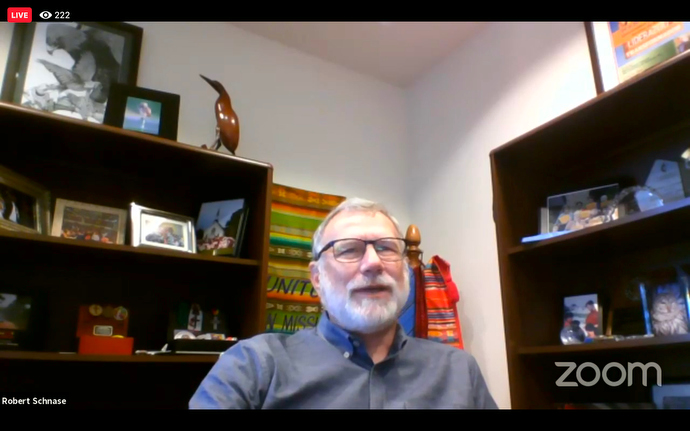
United Methodist bishops plan to name a task force that will examine ways to prevent their funding from going into the red.
Without any changes, the denomination’s financial leaders project that the Episcopal Fund that supports the bishops’ work will run out of money in four years.
At its virtual meeting May 1, the bishops approved a motion to tackle the problem themselves.
The motion calls for the bishops’ executive committee to name a diverse group of bishops to “develop a strategy to move us toward financial sustainability for episcopal leadership.”
Bishop Robert Schnase, who leads the Rio Texas Conference, presented the motion.
The previous day, the bishops met in closed session with the Rev. Moses Kumar — top executive of the General Council on Finance and Administration — to discuss the state of the Episcopal Fund.
Schnase quoted Kumar, who told the bishops: “Hope is not a strategy.”
“But in the end, I heard no strategy and I began to lose hope as we looked at those numbers,” Schnase said. “It made me wonder if we bishops should become more active in forming a strategy or do we let this just happen to us, shaped by other forces?”
The Episcopal Fund — supported by church offerings — covers the costs of bishops’ salaries, benefits and housing. The fund also supports each bishop’s conference office staff, their shared ecumenical staff, their travel and their twice-yearly meetings such as this one, which was the bishops’ first-ever virtual meeting.
Various groups make decisions that affect the bishops’ budget. Conferences give apportionments — that is, requested giving — that provide revenue for the entire fund. The General Council on Finance and Administration board sets the bishops’ salaries, housing allowance and staff support. General Conference — the denomination’s top lawmaking body — ultimately sets the denomination’s budget and determines the number of bishops.
What about bishop retirements?
The pandemic has postponed not only General Conference but also jurisdictional and central conferences where new bishops are elected. The Council of Bishops spent part of its closed session April 30 discussing what these delays mean for bishop retirements initially planned for this year and early next year.
Bishop Kenneth Carter, outgoing president and leader of the Florida Conference, reported the next day that the bishops “will ensure episcopal coverage.”
He said the bishops in each jurisdiction in the U.S. and each central conference in Africa, Europe and the Philippines will work with their respective committees on episcopacy to fill any vacancies. The Council of Bishops has final approval on any interim bishops.
It is not unusual for retired bishops to return to active service for a time when, for whatever reason, a fellow bishop can no longer serve.
In 2019, conferences gave 86.9% of apportionments to the Episcopal Fund. That’s better than the 86.4% collection rate GCFA projected last fall, but not enough to reverse the depletion of funds.
Subscribe to our
e-newsletter
Last year, Rick King — GCFA’s chief financial officer — told bishops that at current collection rates, the fund’s reserves would be gone by 2024.
With the economic wreckage of the COVID-19 pandemic, church leaders worry giving will plummet still further.
The United Methodist Church currently has 66 active bishops supported by the denomination’s Episcopal Fund. In 2016, General Conference called for adding five more bishops in Africa, starting in 2021.
With the coronavirus-caused postponement of General Conference to 2021, Schnase said the bishops have more time to work on a strategic approach.
He said some partial remedies being considered including phasing in the new African bishops, reducing support for office staff and cutting housing allowances.
He said the bishops’ task force would consider all ideas for reducing costs and improving income, organize them into a coherent plan and bring that plan back to the full Council of Bishops for approval.
“If we had a conscientious plan, other groups might be willing to follow our suggestions,” Schnase said.
Bishops also dealt with other funding matters during their meeting.
Bishop B. Michael Watson, outgoing ecumenical officer, highlighted the Bridges of Unity Fund, an endowment established with the United Methodist Foundation in the early 2000s. The fund is designed to support the denomination’s ecumenical and interreligious ministries, but has remained largely untouched, Watson said.
“We have recently rediscovered this fund and want to give it the attention it deserves,” he said. “The bishops’ staff will be working with GCFA to establish the proper use of the fund and encourage contributions to it.”
The bishops also approved using $5,000 from Interdenominational Cooperation Fund, the general church fund that supports church ecumenical work. Of that amount, $2,000 will go toward creating curriculum and $3,000 will go toward the World Council of Churches consultation on migration.
“All of the money is in hand,” Watson said. “It is designated for this work.”
Hahn is a multimedia news reporter for United Methodist News. Contact her at (615) 742-5470 or newsdesk@umcom.org. To read more United Methodist news, subscribe to the free Daily or Weekly Digests.Like what you're reading? Support the ministry of UM News! Your support ensures the latest denominational news, dynamic stories and informative articles will continue to connect our global community. Make a tax-deductible donation at ResourceUMC.org/GiveUMCom.



